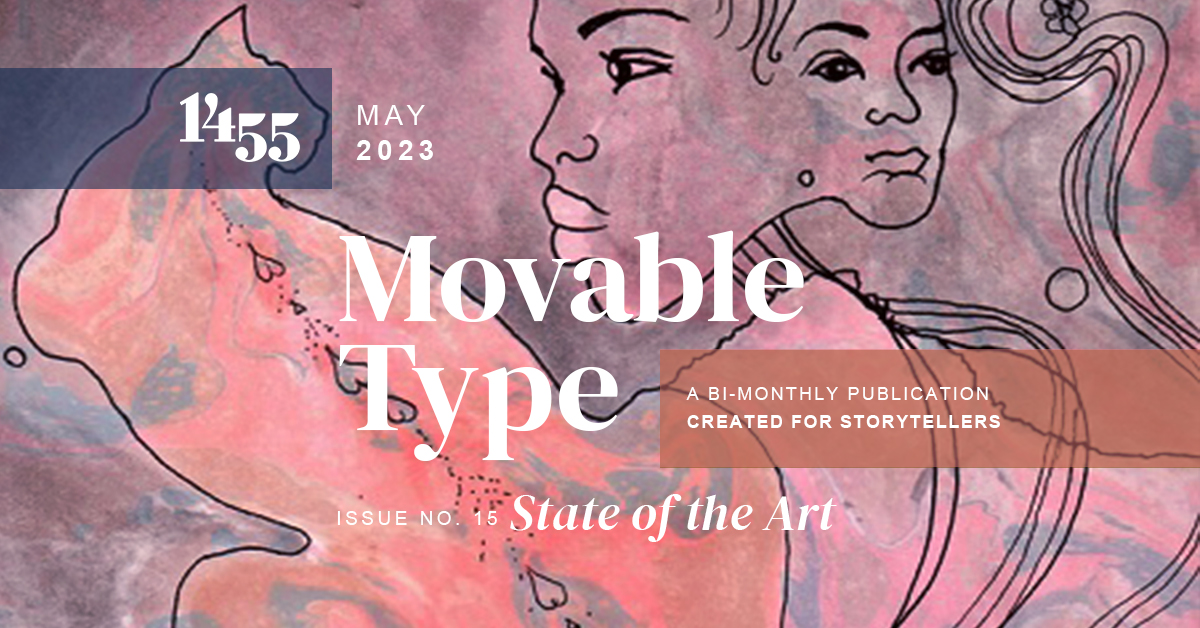JaMES ALLEN HALL
INTRODUCTION FROM SEAN MURPHY
How to be a literary citizen? There’s no single definition or way to be part of the community, but one way I’d recommend is letting a writer know when you appreciate their work. I’m in the habit, and it’s one I recommend, of not hesitating to drop a quick line of gratitude when I come across a piece of work that improves my life. (I also recommend subscribing to Poetry Daily, curated by my awesome alma mater George Mason University.)
An email exchange followed, and copies of recently-published poetry collections were exchanged, and I asked James if 1455 could feature him and his astonishing new book, Romantic Comedy (Four Way Books), for Movable Type. To my delight, he said yes, and we are enthused to share some of his poems. This, my friends, is how literary community works, and you are cordially invited to join the party. Pick up your copies of Romantic Comedy via our friends at D.C.’s historic Potter’s House and help support independent booksellers!
POEMS
The Saw
Museo de la Tortura, Toledo, Spain
Someone heated the iron, cut one side jagged. A man
hoisted the criminal up. Angled
the saw at his scrotum. Criminal, because he followed
a plainclothes soldier home,
kissed him open-eyed, saw night shredded down
to morning, saw too late
in his lover’s closet the uniforms, legs halved by hanging.
The prayer to bless the saw
is beautiful. Sierra: my lover corrects my tongue
as we stand in the museum,
our hands pressed against the stained glass of the wrong
century. Steel pig masks stare back
beside the wrack, the maiden, the ghostly pontiff hoods,
eyeing my wrists. Last night I was
suspect, he the guard tying me down, turning me from witness
into tool, body hammered into new
use. How easily its pliancy the flesh forgets. It took me hours
before I could re-enter myself.
The sharpness perforating me. Today I am following the man
as if he is my home. I let him
shut me inside the iron maiden because I want to know
the interior history of pain,
to love the force in the world that wants me torn apart.
On Dark Days, I Imagine My Parents’ Wedding Video
My mother, Anita Bryant, waves to the cameras
without looking at the men behind them, her chastity
intact, unassailable as her perfect coiffure, dark
as coffee, the white saucer of her face. The news
conference is a whirl of men, microphones. Save
the Children blaring on a banner behind her.
I am waiting to be born, a child unlike others,
one my mother would not save. The reporters’
blazers are plaid, unbuttoned; he’s disguised
like them, the man approaching the dais,
my father. I love my mother, innocent, smiling
at the softball questions, I like the hiding in plain
sight that the man and the Anita are doing
before they become my parents. I like knowing
more than the camera. And here is the moment,
their kiss: the man slaps a pie square in Anita’s face.
She hadn’t seen him coming. She was saying,
What they want is the right to propose to our children
that theirs is an acceptable life. Then it’s time for cake.
I like his hate which hates her back. She is my mother
because she says, At least it’s a fruit pie, then begins
to sob. I like watching her dissolve,
thirty years ago now, my father dead, buried,
and no one remembers his name.
Please Enjoy These Coming Attractions
A friend keeps writing about the little blue pills,
every poem a time bomb he plants inside his body.
My little brother says he knows how he’ll end it too:
plastic bag over his head, cinched with rubber bands.
A lover said he loaded the gun once, clicked the safety
off, held it to his head. The barrel left a surprised O
at his temple for a day. My former teacher crushes crystals,
dirty gray, in a bowl, then holds them in his palm,
the charred remains of pleasure. The college freshman
shows me the delicate x’s the X-Acto made, crossing
his blue veins at sixteen. Chris hanged himself
on a closet door with hotel towels on vacation in Peru.
Every gay man inhabiting my students’ short stories
crossed out by AIDS or hate crime. Is it any wonder
I have failed to imagine my life won’t end
in autopsy? Hey, straight reader.
Spin this loaded gun between us.
Let’s see whose life it chooses.
Early English History
Was too early: 8am Tuesday/Thursday, Elizabeth Hall.
I slouched half-asleep, first-rowed, demarcated
from the frat boys sitting in back so they could see
up the professor’s skirt. In the mead hall after,
they surrounded, let me close if I shared my notes.
I was in love with the black-haired outfielder,
his backwards Braves cap, until he called me fag
for refusing to rate our teacher’s underwear.
I didn’t know how to fight back. I learned that semester
about the rebel queen Boudica, whose revolt razed
three Roman forts and the emperor’s temple.
Tacitus provides motive: her husband dead, kingdom
annexed, Boudica flogged, her daughters raped.
The armies she led tortured its captives
but he doesn’t say why. Some pain is negligible;
its survival cancels the wound of its birth.
Most accounts say she poisoned herself,
facing defeat. Cassius Dio gives her longer:
secreted away to the south, living unrecorded
for years with her daughters. The boys in my class
drew stick figures fucking on the wall by my room
after I came out. I woke at night to wash out
the crooked glyphs, the caption proclaiming
“AIDES kills faggs dead.” I scrubbed until
what remained was fist-sized, vague and pink,
a map of the possible world. Our final project
was to cook an authentic English banquet,
eaten family-style at the professor’s house.
At the appointed time in the year of our lord,
I came with dessert but did not see the moat
she’d installed in her foyer. The strawberry pudding
flew like an arrow, pink spurting everywhere,
especially across the faces of those boys whose names
were lost the moment I joined an insurrection
begun in AD 61 by a dissident queen. In the years
since my disappearance, I have cemented
my escarpments, foddered my canon, sewn up
my flag. I am painting my face, bluing my body
with woad. Warn them. I am coming
to punish my Romans.
Romantic Comedy
Enchanted, 2007
Goddamn the snow that sent me into the theater
for two hours’ refuge in projected light. Even if
I only wanted escape, goddamn my wanting.
Goddamn the romantic comedy, a genre pockmarked
by selves who never fulfill themselves. Goddamn
the men like me, holding hands next to me in the dark,
their snippets of growl gilding the film, their delight
at the comic heroine’s transformation from cartoon
to flesh. She falls from Technicolor to Times Square,
rising from the underground in her marriage gown.
Goddamn her flawless skin, her eyes rinsed red,
waking in a drainpipe at the beginning of a soured century.
And then, God, after the movie’s over and I’ve been flung
into another city’s sprawl, after I’ve been released
from the fold forlorn, damn the bride emerging
from the Renaissance Hotel across the salted avenue,
a vision in an unsullied dress. Goddamn the fabric
so luminous in the portrait, looming from its frame,
filling us with longing to bite it into shreds. Goddamn,
what’s wrong with me? I can’t stop thinking about the fairytale
princess, her optimism a perfumed wind in a flagging sail.
As if no one is shipwrecked on the shores of Love
Always Fails Us. The groom is whispering, Goddamn
you’re wet in the hotel laundry to a bridesmaid
whose white fur wrap is a strip of fallen weather
on the cement floor. Goddamn all beauty made in betrayal.
Goddamn the bride, she wants to live the heroine’s life,
all shivering lip and beaded veil, goddamn her
until she is weeping, the cartoon fool. The goddamn concierge
opens the car door for her, bending elegantly
at the waist to palm her dress into the limousine.
He fingers the slight hem. Goddamn him, showing us
what he could do to skin on the belly, skin on the thigh,
my untouched cheek. Goddamn the wind, it isn’t the hand
of a lover. Goddamn the wineglass shattering inexplicably
at the best man’s toast. The best men, the worst men, the extras
in the movie which brought me to tears—goddamn them
and the gift of my body. Goddamn the land and the air,
the fish and the fowl, the light in the day and the night
in the night. But do not damn the lit cigarette I’m holding
too close to my face. Not it, God. Though it burns acrid
between my fingers, it does not leave me alone to lift
my face up out of the halo of darkness, in the cold of Chicago.

James Allen Hall
James Allen Hall (he/they) is the author most recently of Romantic Comedy, chosen by Diane Seuss for the Levis Prize and published by Four Way Books (2023). A previous collection of poems, Now You’re the Enemy, appeared in 2008 (U of Arkansas) and won awards from the Lambda Literary Foundation, the Texas Institute, and the Fellowship of Southern Writers. Their book of lyric personal essays, I Liked You Better Before I Knew You So Well, won the Cleveland State University Poetry Center Essay Collection Award and was published in 2017. They live in Chestertown, MD where they direct the Rose O’Neill Literary House at Washington College.
Website: jamesallenhall.com
Twitter: @jamesallenhall
Instagram: @freedverses


